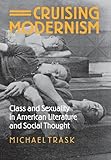Cruising Modernism : Class and Sexuality in American Literature and Social Thought / Michael Trask.
Material type: TextPublisher: Ithaca, NY : Cornell University Press, [2018]Copyright date: ©2003Description: 1 online resource (240 p.) : 3 halftonesContent type:
TextPublisher: Ithaca, NY : Cornell University Press, [2018]Copyright date: ©2003Description: 1 online resource (240 p.) : 3 halftonesContent type: - 9781501717475
- 810.9/112
- PS228.M63T73 2003
- online - DeGruyter
| Item type | Current library | Call number | URL | Status | Notes | Barcode | |
|---|---|---|---|---|---|---|---|
 eBook
eBook
|
Biblioteca "Angelicum" Pont. Univ. S.Tommaso d'Aquino Nuvola online | online - DeGruyter (Browse shelf(Opens below)) | Online access | Not for loan (Accesso limitato) | Accesso per gli utenti autorizzati / Access for authorized users | (dgr)9781501717475 |
Frontmatter -- Contents -- Acknowledgments -- Introduction -- Chapter One. Pervert Modernism -- Chapter Two. Chance, Choice, and The Wings of the Dove -- Chapter Three. Making Do with Gertrude Stein -- Chapter Four. Hart Crane's Epic of Anonymity -- Chapter Five. Willa Gather's Catechism -- Chapter Six. Merging with the Masses -- Conclusion -- Notes -- Index
restricted access online access with authorization star
http://purl.org/coar/access_right/c_16ec
Modern society, Michael Trask argues in this incisive and original book, chose to couch class difference in terms of illicit sexuality. Trask demonstrates how sexual science's concept of erotic perversion mediated the writing of both literary figures and social theorists when it came to the innovative and unsettling social arrangements of the early twentieth century. Trask focuses on the James brothers in a critique of pragmatism and anti-immigrant sentiment, shows the influence of behavioral psychology on Gertrude Stein's work, uncovers a sustained reflection on casual labor in Hart Crane's lyric poetry, and traces the identification of working-class Catholics with deviant passions in Willa Cather's fiction. Finally, Trask examines how literary leftists borrowed the antiprostitution rhetoric of Progressive-era reformers to protest the ascendance of consumerism in the 1920s.Viewing class as a restless and unstable category, Trask contends, American modernist writers appropriated sexology's concept of evasive, unmoored desire to account for the seismic shift in social relations during the Progressive era and beyond. Looking closely at the fraught ideological space between real and perceived class differences, Cruising Modernism discloses there a pervasive representation of sexuality as well.
Mode of access: Internet via World Wide Web.
In English.
Description based on online resource; title from PDF title page (publisher's Web site, viewed 26. Apr 2024)


